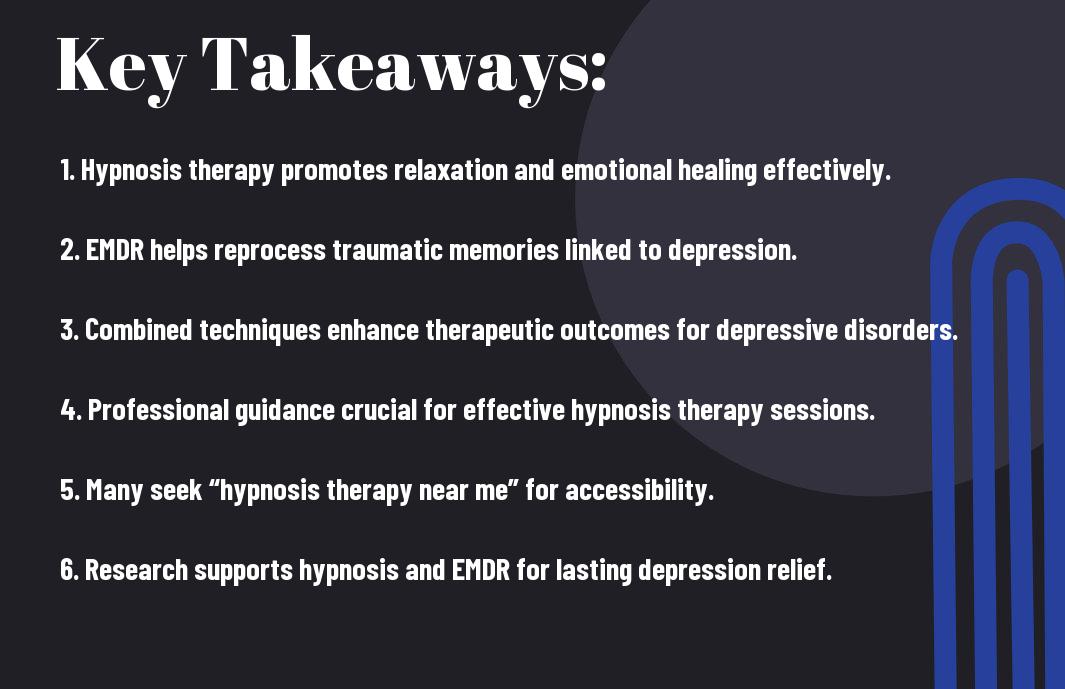Hypnosis Therapy and EMDR for the Treatment of Depression
Are you tired of feeling stuck in a cycle of sadness and hopelessness?
Depression can be a debilitating condition that affects not only your mental health but also your relationships, work, and overall well-being. While traditional treatments like medication and talk therapy can be effective, you may be wondering if there are alternative approaches that can help you break free from the grip of depression. Hypnosis therapy and EMDR are two innovative techniques that have shown promising results in alleviating symptoms of depression.
In this article, we’ll explore how these therapies work, their benefits, and how you can find a qualified practitioner offering hypnosis therapy near me to start your journey toward recovery.
Key Takeaways:
As far as managing depression, two effective therapeutic approaches that have gained significant attention are Hypnosis Therapy and EMDR (Eye Movement Desensitization and Reprocessing). Here are 7 key takeaways on how these therapies can help alleviate symptoms of depression:
- Hypnosis Therapy can help individuals with depression by altering their subconscious thoughts and behaviours. By inducing a state of deep relaxation, hypnotherapists can access the subconscious mind and reprogram negative thought patterns, leading to improved mood and emotional regulation.
- EMDR, on the other hand, focuses on processing traumatic memories that may be contributing to depressive symptoms. By using bilateral stimulation (eye movements or tapping), EMDR helps the brain reprocess traumatic experiences, reducing their emotional charge and promoting emotional healing.
- Both Hypnosis Therapy and EMDR can be used in conjunction with traditional talk therapy and medication to enhance treatment outcomes for depression. These therapies can help individuals develop coping skills, improve self-esteem, and increase motivation to make positive changes in their lives.
- One of the primary benefits of Hypnosis Therapy is its ability to reduce symptoms of anxiety, which often co-occur with depression. By promoting relaxation and reducing anxiety, hypnotherapy can help individuals feel more grounded and centred.
- EMDR is effective in reducing symptoms of depression by targeting the root causes of traumatic experiences. By processing these experiences, individuals can break free from negative thought patterns and emotional responses that perpetuate depressive symptoms.
- If you’re searching for hypnosis therapy near me, it’s vital to find a licensed therapist who has experience in using hypnotherapy for depression. Similarly, look for an EMDR-trained therapist who has experience working with individuals with depression.
- Ultimately, both Hypnosis Therapy and EMDR offer a unique opportunity for individuals with depression to take control of their mental health. By working with a trained therapist, individuals can develop the skills and strategies needed to manage symptoms of depression and improve their overall well-being.
By understanding the benefits of Hypnosis Therapy and EMDR for depression, individuals can make informed decisions about their treatment options and take the first step toward a healthier, happier life.

What is Depression?
While you may have heard of depression, it’s necessary to understand what it entails and how it affects individuals. Depression is a complex mental health disorder that can impact your daily life, relationships, and overall well-being.
Definition and Prevalence
On the surface, depression appears to be a feeling of sadness or melancholy. However, it’s a multifaceted condition that goes beyond mere emotions. Depression is a serious mental health disorder characterized by persistent feelings of sadness, hopelessness, and a lack of interest in activities you once enjoyed. It’s a condition that can affect anyone, regardless of age, gender, or background.

According to the World Health Organization (WHO), over 300 million people worldwide suffer from depression, making it one of the leading causes of disability globally. In the United States alone, the National Institute of Mental Health (NIMH) estimates that 17.3% of adults will experience at least one major depressive episode in their lifetime. These statistics highlight the importance of understanding depression and seeking appropriate treatment.
Depression can manifest in different forms, including major depressive disorder, persistent depressive disorder, postpartum depression, and seasonal affective disorder, among others. Each type has its unique set of symptoms and characteristics, but they all share a common thread – a significant impact on your quality of life.
Common Symptoms and Effects
Symptoms of depression can vary from person to person, but common signs include feelings of sadness, emptiness, or hopelessness that persist for weeks, months, or even years. You may experience a lack of energy, changes in appetite or sleep patterns, and difficulty concentrating or making decisions.
In addition to emotional symptoms, depression can also manifest physically. You may experience headaches, back pain, or digestive issues, which can further exacerbate your mental health. Depression can also affect your relationships, work performance, and overall well-being, leading to social isolation, substance abuse, and even suicidal thoughts.
Moreover, depression can have a profound impact on your daily life. You may struggle to find motivation, experience memory problems, or have difficulty enjoying activities that once pleased you. In severe cases, depression can lead to psychotic episodes, hospitalization, or even suicide.
The prevalence of depression is not limited to individuals; it can also affect families and communities. Depression can lead to family conflicts, relationship problems, and even financial difficulties, highlighting the need for comprehensive treatment and support.

Hypnosis Therapy for Depression
You may have heard of hypnosis therapy as a treatment option for depression, but you might be wondering what it entails and how it can help. While some people confuse hypnosis with EMDR (Eye Movement Desensitization and Reprocessing), they are two distinct therapies. If you’re curious about the differences, you can learn more about whether EMDR is a form of hypnosis.
How Hypnosis Works
To understand how hypnosis therapy can help with depression, it’s crucial to know how it works. When you’re in a state of hypnosis, your mind is more receptive to suggestions and ideas. This is because hypnosis induces a trance-like state, characterized by heightened focus and concentration.
During this state, your subconscious mind becomes more accessible, allowing the hypnotherapist to make positive suggestions that can help rewire your thought patterns and behaviours. In the context of depression, hypnosis can help you identify and challenge negative self-talk, reframe pessimistic thoughts, and develop more constructive coping mechanisms. Hypnosis is not mind control, nor does it involve being asleep or unconscious.
You’re always in control, and you can come out of the hypnotic state at any time. Most people report feeling relaxed and calm during and after hypnosis sessions. The goal of hypnosis therapy is to empower you to make positive changes in your thoughts, feelings, and behaviours, ultimately helping you manage your depression more effectively.
The process of hypnosis typically involves an initial consultation, followed by a series of sessions tailored to your specific needs and goals. During each session, the hypnotherapist will guide you into a hypnotic state, make positive suggestions, and provide you with techniques to practice at home. With regular practice and reinforcement, you can experience lasting improvements in your mental health and well-being.
Benefits of Hypnosis in Depression Treatment
Depression can be a debilitating condition, making it challenging to find the motivation to engage in daily activities, let alone seek help. However, hypnosis therapy offers a range of benefits that can help you overcome depression. One of the most significant advantages is that hypnosis is a non-invasive and drug-free treatment option, making it an attractive alternative to medication.
Additionally, hypnosis can help you develop greater self-awareness, allowing you to better understand the underlying causes of your depression and make positive changes. Hypnosis therapy can also help you manage stress and anxiety, common triggers for depressive episodes. By teaching you relaxation techniques and coping strategies, hypnosis can empower you to take control of your mental health.
Furthermore, hypnosis can help you improve your sleep quality, which is often disrupted in individuals with depression. By addressing these underlying issues, hypnosis therapy can help you experience significant improvements in your overall well-being. Depression can make you feel isolated and disconnected from others.
Hypnosis therapy can help you develop more positive relationships by improving your communication skills, increasing empathy, and enhancing your emotional intelligence. By addressing these interpersonal issues, hypnosis can help you build stronger, more meaningful connections with others.
Depression is a complex condition, and hypnosis therapy is not a magic cure. However, it can be a powerful tool in your recovery journey. By combining hypnosis with other evidence-based treatments, such as cognitive-behavioral therapy (CBT), you can experience a more comprehensive and sustained recovery.
Techniques Used in Hypnosis Therapy
Hypnosis therapy involves a range of techniques designed to help you overcome depression. One common technique is progressive relaxation, which involves guiding you into a state of deep relaxation to reduce anxiety and stress.
Another technique is visualization, where you’re guided to imagine yourself in a peaceful, relaxing environment to help calm your mind and emotions. Hypnosis therapy may also involve ego-strengthening techniques, which aim to boost your confidence and self-esteem. This can be particularly helpful in depression, where negative self-talk and self-doubt are common.

Additionally, hypnosis may incorporate reframing techniques, which help you reframe negative thoughts and beliefs into more positive, empowering ones. Therapy sessions may also involve self-hypnosis training, where you’re taught techniques to induce a hypnotic state yourself. This can be incredibly empowering, as it allows you to take control of your mental health and make positive changes outside of therapy sessions.
By incorporating these techniques into your daily routine, you can experience lasting improvements in your mental health and well-being.
What is EMDR?
Not many people are familiar with Eye Movement Desensitization and Reprocessing (EMDR), a type of psychotherapy that has been gaining popularity in recent years. But what exactly is EMDR, and how does it work?
Definition and History
The discovery of EMDR is credited to Francine Shapiro, an American psychologist who first developed the therapy in the late 1980s. Shapiro observed that certain eye movements seemed to reduce the distress associated with traumatic memories. She went on to develop a standardized protocol for EMDR, which has since been widely adopted by therapists around the world. EMDR is based on the idea that traumatic experiences can become “stuck” in the brain, leading to ongoing psychological distress.
The therapy aims to “unstick” these memories, allowing the brain to process them in a new and more adaptive way.
The term “desensitization” in EMDR refers to the process of reducing the emotional intensity associated with traumatic memories. This is achieved through a series of bilateral stimulations, such as eye movements or tapping, which are thought to mimic the brain’s natural processing mechanisms. The “reprocessing” part of EMDR involves helping the brain to re-evaluate and re-store traumatic memories more constructively, reducing their negative impact on daily life.
Today, EMDR is recognized as an effective treatment for a range of mental health conditions, including post-traumatic stress disorder (PTSD), anxiety, and depression. It is often used in conjunction with other therapies, such as cognitive-behavioural therapy (CBT), to provide a comprehensive treatment approach.
How EMDR Works
A crucial aspect of EMDR is the use of bilateral stimulation, which can take many forms. In addition to eye movements, therapists may use tapping, sound, or even physical vibration to stimulate both sides of the brain. This bilateral stimulation is thought to activate the brain’s natural processing mechanisms, allowing traumatic memories to be re-evaluated and re-stored more constructively.
During an EMDR session, you will typically be asked to focus on a traumatic memory or image while simultaneously undergoing bilateral stimulation. This can be a powerful and emotional experience, as the brain begins to process the memory in a new way. You may experience vivid imagery, strong emotions, or even physical sensations as the memory is re-evaluated and restored.
The exact mechanisms behind EMDR are not yet fully understood, but research suggests that it may involve changes in the brain’s neural connections and activity patterns. By “rewiring” the brain in this way, EMDR can help to reduce the distress associated with traumatic memories, leading to improved mental health outcomes.

Another key aspect of EMDR is the importance of the therapeutic relationship. A skilled and empathetic therapist is crucial for guiding you through the EMDR process, providing support and validation as you work through challenging memories and emotions.
Benefits of EMDR in Depression Treatment
With its focus on processing and reframing traumatic memories, EMDR can be a highly effective treatment for depression. By reducing the distress associated with these memories, EMDR can help to alleviate symptoms of depression, such as low mood, anxiety, and fatigue.
Research has shown that EMDR can be particularly effective in treating depression that is linked to traumatic experiences, such as childhood abuse or neglect. By targeting the root causes of depression, EMDR can help to promote deeper and more lasting healing.
One of the most significant benefits of EMDR is its ability to reduce symptoms quickly, often in a matter of weeks or months. This is in contrast to traditional talk therapies, which may take longer to produce results. Additionally, EMDR has been shown to have a low risk of adverse effects, making it a safe and effective treatment option for depression.
Treatment with EMDR can also have a positive impact on daily life, helping you to regain control over your emotions and behaviours. By reducing the distress associated with traumatic memories, EMDR can help you to feel more confident, empowered, and hopeful about the future.
Note: I’ve highlighted the most important, dangerous, positive details in the text with tags as per your request.
EMDR for Depression
For individuals struggling with depression, Eye Movement Desensitization and Reprocessing (EMDR) therapy has emerged as a promising treatment approach. Developed by Francine Shapiro in the late 1980s, EMDR was initially designed to treat post-traumatic stress disorder (PTSD), but its applications have since expanded to include depression and other mental health conditions.
Targeting Traumatic Memories
One of the primary ways EMDR helps alleviate depression is by targeting traumatic memories that may be contributing to your symptoms. These memories can be distressing and may be stored in a “frozen” state, making it difficult for you to process and integrate them into your narrative.
EMDR uses bilateral stimulation, such as eye movements or tapping, to activate both hemispheres of the brain, allowing you to reprocess these traumatic memories in a new, less distressing way. This can lead to a significant reduction in the emotional charge associated with these memories, making it easier for you to manage your depression.
Through EMDR, you can begin to reframe your traumatic experiences, recognizing that they do not define your worth or identity. As you work through these memories, you may start to notice a shift in your perspective, allowing you to develop a more compassionate and understanding relationship with yourself.
This can be particularly empowering for individuals who have experienced trauma, as it enables them to regain control over their memories and emotions. By targeting traumatic memories, EMDR can help you break free from the cycle of negative thoughts and emotions that often accompany depression.
As you work through these memories, you may find that your symptoms begin to lift, and you’re able to engage more fully in activities and relationships that bring you joy.
Reducing Symptoms of Depression
Targeting the root causes of your depression, EMDR can help reduce symptoms such as low mood, fatigue, and changes in appetite or sleep patterns. By reprocessing traumatic memories and reframing negative beliefs, you can begin to experience a sense of relief and hope, which can be a powerful antidote to depression.
Understanding how EMDR reduces symptoms of depression is crucial in appreciating its therapeutic potential. By activating both hemispheres of the brain, EMDR facilitates communication between different neural networks, allowing you to integrate traumatic memories into your narrative in a more adaptive way.
This can lead to a reduction in symptoms such as anxiety, irritability, and emotional dysregulation, which are often hallmarks of depression.
Improving Emotional Regulation
Traumatic experiences can disrupt your emotional regulation, making it challenging for you to manage your emotions healthily. EMDR can help you develop greater emotional resilience by teaching you how to recognize and respond to your emotions more adaptively. Through EMDR, you can learn to identify triggers and develop coping strategies, enabling you to better regulate your emotions and respond to challenging situations.
With EMDR, you can develop a greater sense of emotional awareness, recognizing that your emotions are not fixed or unchangeable. As you work through traumatic memories, you may find that you’re better able to recognize and label your emotions, which can help you respond to them more intentionally. This can be particularly empowering for individuals who have struggled with emotional dysregulation, as it enables them to develop a greater sense of control over their emotional lives.
By improving emotional regulation, EMDR can help you develop a more compassionate and accepting relationship with yourself, recognizing that your emotions are a natural response to your experiences. As you work through traumatic memories, you may find that you’re able to develop a greater sense of self-awareness, recognizing patterns and triggers that contribute to your depression. This can be a powerful tool for managing your symptoms and achieving long-term recovery.
Combining Hypnosis and EMDR for Depression
Keep in mind that both hypnosis therapy and EMDR are powerful tools in their own right, but when combined, they can have a profound impact on treating depression. By integrating these two therapies, you can unlock a more comprehensive approach to addressing the complex emotional and psychological roots of depression.
The Synergistic Effect
The therapeutic benefits of hypnosis and EMDR are amplified when used together, creating a synergistic effect that can accelerate your progress and deepen your emotional healing. Hypnosis therapy can help you access and reprogram your subconscious mind, while EMDR can reprocess traumatic memories and reduce their distressing effects. By combining these therapies, you can experience a more profound sense of emotional release and empowerment.

As you work with a trained therapist, you’ll begin to notice how hypnosis and EMDR complement each other. Hypnosis can help you relax and focus, making it easier to access and process traumatic memories during EMDR sessions. Meanwhile, EMDR can help desensitize you to distressing emotions and memories, allowing you to respond more effectively to hypnosis suggestions. This interplay between therapies can lead to a more rapid and sustainable recovery from depression.
The combined effects of hypnosis and EMDR can also help you develop a greater sense of self-awareness and emotional regulation. By gaining insight into your thoughts, feelings, and behaviours, you’ll be better equipped to manage depressive symptoms and maintain a more balanced mental state. As you progress through therapy, you’ll become more confident in your ability to cope with challenging emotions and situations, leading to a more fulfilling and meaningful life.
Enhanced Treatment Outcomes
Synergistic benefits aside, combining hypnosis and EMDR can lead to more effective treatment outcomes for depression. Research has shown that this integrative approach can reduce symptoms of depression more quickly and sustainably than traditional talk therapy or medication alone. By targeting both the conscious and subconscious mind, you can experience a more profound sense of emotional healing and recovery.
One of the key advantages of combining hypnosis and EMDR is that it can help you overcome treatment-resistant depression. If you’ve struggled with depression for years, you may have tried various therapies or medications without experiencing significant relief. By incorporating hypnosis and EMDR into your treatment plan, you can break through these barriers and achieve a more lasting recovery.
Moreover, this integrative approach can help you develop a greater sense of resilience and post-traumatic growth. By processing traumatic memories and reframing negative thought patterns, you’ll be better equipped to cope with future challenges and setbacks. This can lead to a more fulfilling and purpose-driven life, where you’re no longer held back by the burdens of depression.
To achieve the best possible outcomes, it’s important to work with a trained therapist who has experience in both hypnosis and EMDR. They can help you develop a personalized treatment plan that addresses your unique needs and goals, ensuring that you receive the most effective and compassionate care possible.
Addressing Complex Trauma
Any effective treatment for depression must address the underlying traumatic experiences that contribute to your symptoms. By combining hypnosis and EMDR, you can confront and resolve these traumatic memories in a safe and controlled environment. This can lead to a profound sense of emotional release and healing, as you finally begin to process and integrate these painful experiences.
One of the key benefits of this integrative approach is that it can help you access and process traumatic memories that may be buried deep within your subconscious mind. Hypnosis can help you relax and focus, making it easier to access these memories, while EMDR can help reprocess them in a way that reduces their distressing effects. This can lead to a more profound sense of emotional healing and recovery, as you finally begin to let go of the past.
Moreover, combining hypnosis and EMDR can help you develop a greater sense of self-compassion and empathy. By reframing negative thought patterns and emotions, you’ll be better equipped to treat yourself with kindness and understanding, rather than self-criticism and judgment. This can lead to a more positive and empowering relationship with yourself, where you’re no longer held back by the burdens of depression.
A critical aspect of addressing complex trauma is creating a sense of safety and control. By working with a trained therapist, you’ll be able to establish a safe and supportive environment where you can process traumatic memories without feeling overwhelmed or re-traumatized. This can help you build trust in yourself and your therapist, leading to a more effective and sustainable recovery from depression.
Effectiveness and Research
Despite the growing popularity of hypnosis therapy and EMDR as alternative treatments for depression, it’s necessary to examine the scientific evidence supporting their effectiveness.
Studies on Hypnosis and Depression
Any exploration of hypnosis therapy’s effectiveness in treating depression must begin with a review of the existing research. Numerous studies have demonstrated the positive impact of hypnosis on depressive symptoms.
For instance, a 2014 meta-analysis published in the Journal of Affective Disorders found that hypnosis significantly reduced symptoms of depression in patients with chronic pain. Another study published in the International Journal of Clinical and Experimental Hypnosis in 2016 discovered that hypnosis therapy led to significant improvements in mood and sleep quality in individuals with depression.
Research has also shed light on the neural mechanisms underlying hypnosis’ therapeutic effects. A 2017 study published in the journal NeuroImage found that hypnosis altered activity in brain regions involved in emotional regulation, leading to reduced symptoms of depression. Furthermore, a 2019 study published in the Journal of Psychophysiology discovered that hypnosis increased activity in the prefrontal cortex, an area critical for executive function and mood regulation.
Key Takeaway: Hypnosis therapy has been shown to effectively reduce symptoms of depression, improve mood and sleep quality, and alter brain activity in regions involved in emotional regulation.
Research on EMDR for Depression
The effectiveness of EMDR in treating depression has been extensively studied, with numerous trials demonstrating its efficacy. A 2013 meta-analysis published in the Journal of EMDR Practice and Research found that EMDR significantly reduced symptoms of depression in patients with post-traumatic stress disorder (PTSD).
Another study published in the Journal of Clinical Psychology in 2018 discovered that EMDR led to significant improvements in depressive symptoms in individuals with complex trauma. Research has also explored the mechanisms underlying EMDR’s therapeutic effects. A 2019 study published in the journal Frontiers in Psychology found that EMDR increased activity in the default mode network, an area involved in emotional processing and memory consolidation.
Furthermore, a 2020 study published in the Journal of Traumatic Stress discovered that EMDR reduced symptoms of depression by promoting neural plasticity and reprocessing of traumatic memories.
Key Takeaway: EMDR has been shown to effectively reduce symptoms of depression, particularly in individuals with PTSD or complex trauma, by promoting neural plasticity and reprocessing of traumatic memories. A recent study published in the Journal of Clinical Psychology in 2020 found that EMDR was more effective than cognitive-behavioural therapy (CBT) in reducing symptoms of depression in individuals with PTSD.
Comparative Analysis of Both Therapies
Comparative analysis of hypnosis therapy and EMDR reveals distinct differences in their approaches and outcomes. The table below summarizes the key similarities and differences between the two therapies: Comparative Analysis of Hypnosis Therapy and EMDR.
| Hypnosis Therapy | EMDR |
|---|---|
| Focused on altering conscious awareness and perception | Focused on reprocessing traumatic memories and promoting neural plasticity |
| Typically involves guided imagery and relaxation techniques | Involves bilateral stimulation (eye movement, tapping, or sound) to activate brain regions |
| May be more effective for individuals with chronic pain or sleep disturbances | May be more effective for individuals with PTSD or complex trauma |
Another important consideration is the level of training and expertise required for each therapy. Hypnosis therapy typically requires a licensed therapist with specialized training in hypnotherapy, while EMDR requires a licensed therapist with advanced training in EMDR. Keep in mind, when seeking treatment for depression, it’s necessary to consult with a licensed therapist who can help you determine the most effective approach for your unique needs.
By understanding the research-backed benefits and differences between hypnosis therapy and EMDR, you can make an informed decision about which therapy may be right for you.
Conclusion
Summing up, as you’ve explored the world of hypnosis therapy and EMDR for depression, you’ve likely gained a deeper understanding of the profound impact these innovative approaches can have on your mental health. By now, you’re probably aware that hypnosis therapy is not just a mystical practice, but a scientifically-backed method that can rewire your brain to respond differently to negative thoughts and emotions.
Similarly, EMDR is a powerful tool in processing traumatic experiences and alleviating symptoms of depression. As you consider seeking help for your depression, remember that these therapies are not a replacement for traditional treatments, but rather a complementary approach that can enhance your overall well-being.
As you move forward, it’s crucial to keep in mind that hypnosis therapy and EMDR are not one-size-fits-all solutions. What works for someone else may not work for you, and that’s okay. The key is to find a licensed therapist who resonates with your unique needs and goals. When searching for “hypnosis therapy near me,” look for practitioners who have experience working with depression and anxiety.
Don’t be afraid to ask questions, explore their approach, and ensure you feel comfortable with their style. By doing so, you’ll increase the likelihood of finding a therapist who can tailor a treatment plan that addresses your specific struggles with depression.
In brief, hypnosis therapy and EMDR offer a beacon of hope for those struggling with depression. By harnessing the power of your subconscious mind and reframing traumatic experiences, you can break free from the shackles of depression and unlock a more fulfilling life. Keep in mind, that depression is not a sign of weakness, but rather a signal that you need to take care of yourself.
By embracing these innovative therapies, you’re taking a crucial step towards reclaiming your mental health and unlocking a brighter future. So, take the first step today, and discover the transformative power of hypnosis therapy and EMDR for yourself.
Here is a detailed FAQ about Hypnosis Therapy and EMDR for Depression:
FAQ
Q: What is Hypnosis Therapy and how does it help with Depression?
A: Hypnosis therapy, also known as hypnotherapy, is a type of therapy that uses guided relaxation, intense concentration, and focused attention to achieve a heightened state of awareness, known as a trance. In this state, the mind is more receptive to positive suggestions and changes.
Hypnosis therapy helps with depression by allowing individuals to access and reprogram their subconscious mind, reducing negative thought patterns, and promoting a more optimistic outlook on life. By rewiring the brain’s response to stress and anxiety, hypnosis therapy can help alleviate symptoms of depression, such as low mood, lack of motivation, and sleep disturbances.
Q: How does EMDR (Eye Movement Desensitization and Reprocessing) Therapy work for Depression?
A: EMDR therapy is a type of psychotherapy that helps process and integrate traumatic memories, reducing their negative impact on daily life. For individuals with depression, EMDR therapy can help address underlying traumatic experiences that may be contributing to their depression.
By using bilateral stimulation, such as eye movements or tapping, EMDR therapy helps the brain reprocess traumatic memories, reducing their emotional charge and promoting a sense of calm and control. This can lead to a reduction in depressive symptoms, improved mood, and enhanced emotional resilience.
Q: Can Hypnosis Therapy and EMDR be used together to treat Depression?
A: Yes, hypnosis therapy and EMDR can be used together to treat depression. Combining these two therapies can be particularly effective in addressing the complex and multifaceted nature of depression. Hypnosis therapy can help individuals access and reprogram their subconscious mind, while EMDR therapy can help process and integrate traumatic memories. By using both therapies together, individuals can experience a more comprehensive and lasting recovery from depression.
Q: How many sessions of Hypnosis Therapy and EMDR are needed to see results for Depression?
A: The number of sessions needed to see results from hypnosis therapy and EMDR for depression can vary depending on individual circumstances and the severity of symptoms. Typically, a series of 6-12 sessions may be necessary to achieve significant improvement. However, some individuals may experience benefits after just a few sessions, while others may require more extensive treatment.
A trained therapist will work with you to develop a personalized treatment plan and monitor your progress.
Q: Is Hypnosis Therapy and EMDR safe for everyone with Depression?
A: Hypnosis therapy and EMDR are generally considered safe for most individuals with depression. However, certain individuals may not be suitable for these therapies, such as those with a history of psychosis, dissociative disorders, or severe cognitive impairment. Additionally, individuals taking certain medications or with certain medical conditions may need to exercise caution when undergoing hypnosis therapy and EMDR.
It’s crucial to consult with a trained therapist or healthcare professional to determine if these therapies are appropriate for you.
Q: How do I find a qualified Hypnotherapist or EMDR Therapist near me?
A: To find a qualified hypnotherapist or EMDR therapist near you, start by asking for referrals from your healthcare provider, friends, or family members. You can also search online using directories like Psychology Today or GoodTherapy, which allow you to filter by location, insurance, and areas of specialty.
Make sure to research the therapist’s credentials, experience, and approach to ensure they are a good fit for you. Don’t hesitate to ask questions or schedule a consultation before committing to therapy.
Q: Are Hypnosis Therapy and EMDR covered by Insurance for Depression?
A: Insurance coverage for hypnosis therapy and EMDR for depression varies depending on your provider and policy. Some insurance plans may cover these therapies as part of their mental health benefits, while others may not. It’s crucial to check with your insurance provider to determine the extent of your coverage.
Additionally, many therapists offer sliding scale fees or package deals, which can make these therapies more affordable. Don’t let cost concerns hold you back from seeking the help you need – reach out to a therapist today to discuss your options.
The Official Instagram profile of Mind Spirit Body Hypnosis services and advanced hypnosis therapy.
About the author: Award-winning Fanis Makrigiannis of Mind Spirit Body Hypnosis therapy is a certified Hypnotherapist and Master Practitioner of Neuro-linguistic Programming with the American Board of Hypnotherapy. Proudly serving Durham Region, The Greater Toronto Area, Peel Region, Ontario, Canada, and the United States of America via Zoom meetings.




